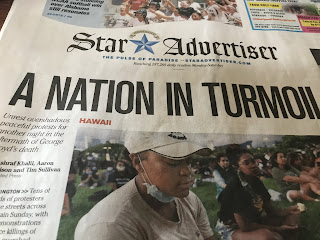In the midst of a pandemic, we suddenly are thrust into another crisis that has brought anger and strife into an already-hurting world. The killing of a black man by a white police officer in Minneapolis has forced us to closely examine our personal feelings. Do we feel anger or sadness or pity? Do we worry that someone we know may be placed in a similar situation? And we react differently. For some, this means going out in public to peacefully protest despite the health crisis we are presently experiencing. For others, it means sharing our angry thoughts and feelings on social media. For me, it meant examining my own actions when I was a school principal.
Our school was 98% military-impacted, and about 20% to 25% of our students identified as Black. During my tenure as principal from 2003-2018, we carefully reviewed data to ensure that all students were receiving an equitable education and the necessary services so they could be successful. We met regularly to share concerns about students who were having social, academic, or emotional challenges so we could collectively address their needs and share their progress. A good percentage were students of color, and I know we did our best to provide support for them. But was that enough? As I sit here and reflect, I realize that we could have and should have done more, not just for those struggling students but for ALL students. We should have taught them skills and strategies to be able to verbalize and to understand their own and other people’s feelings and emotions. We should have done temperature checks to see whether our curriculum was making a difference for students. We should have paid better attention when students were struggling to understand the underlying reasons for their struggles. Just because racism was not evident at our school doesn’t mean that it wasn’t bubbling under the surface or that we shouldn’t talk about it.
And that is the problem. We sweep difficult issues like racism to the side or we water it down so we don’t offend anyone or we have discussions only when something like what happened in Minneapolis dominates the news. We learn about Martin Luther King, Jr. or Ruby Bridges or Rosa Parks during Black History Month, but do we delve deeper into why they are an important part of our history or why we haven’t made the progress we had hoped for? Do we ask our students to discuss issues of race at home, and do our students have the opportunity to interview their parents or grandparents or other family members about their experiences with racism? Do we let students research about other injustices in our history including against Native Americans, Native Hawaiians, Asian Americans, Hispanics, and others? When we teach social-emotional lessons to our little ones, do we talk about the color of one’s skin and the beauty of diversity or do we just talk about treating others with respect?
I remember reading
Black Like Me sometime in the early 1970’s. It was not an assignment for school so I never discussed the book with anyone. It was disturbing. I remember talking story with a young female teacher of color from New York. She shared that when she was a little girl, she saw her dad stopped by cops for being Black. Her parents emphasized that she had to be compliant if she was ever stopped by a police officer. She was a strong woman who spoke her mind, so her parents were probably very worried for her. I remember our meetings with parents of students who were black and were having trouble controlling their anger when they were upset. These parents were very concerned and shared their fears that their child would face a difficult future if he/she was unable to control their anger. How do we teach our students to be strong and stick up for their rights when there is a real possibility of being hurt in the process because of the color of their skin?
I see posts from educators on social media about books to read and resources to use and how to prepare for those difficult discussions about racism when school resumes in the next few months, but it cannot be a few teachers in their classrooms. That discussion needs to involve all staff at a school as well as members of the community. We may feel that the topic of racism is not relevant for our students or our community because we have not experienced it. However, we cannot ignore the fact that the racial divide in our country has never been resolved, not since the Civil War ended or the riots and demonstrations of the 1960’s. Racism simmers below the surface until it is suddenly thrust on us unexpectedly. Then we scramble to try to examine and address our personal feelings. By then, it is too late.
Being retired has provided me the opportunity to see issues more clearly. Our students today will be the leaders of tomorrow. We need them to learn about and honestly discuss issues that will impact them, not just now, but in their future. We need teachers who are prepared to have frank and open discussions with their students. This will require professional development sessions on how to talk
with kids about difficult issues. We need literature that addresses issues of racism or injustice. We need students to have opportunities to work collaboratively to address these sensitive issues and to offer a way forward for their school or their community. We need parents and community members to be more involved in addressing problems that are impacting our students and being part of the solution.
Empathy is the ability to understand the feelings of others. We may not have personally experienced racism and injustice, but if we have empathy, we know that the time to address these issues is long overdue. Let’s make this a priority in schools.




